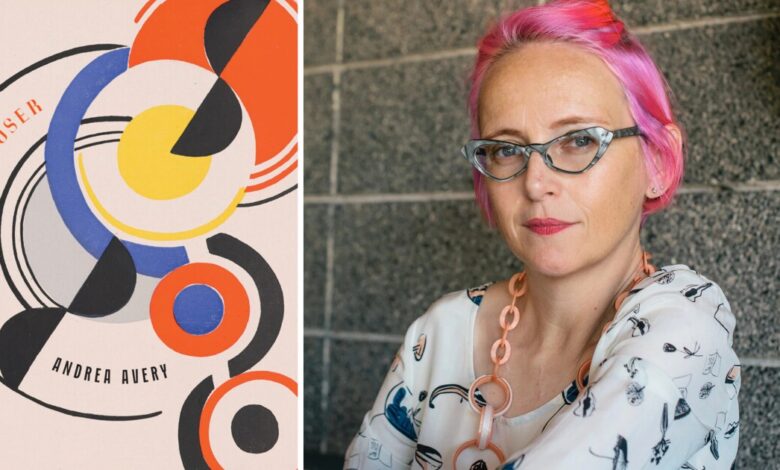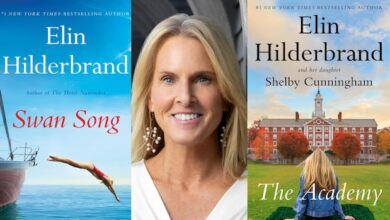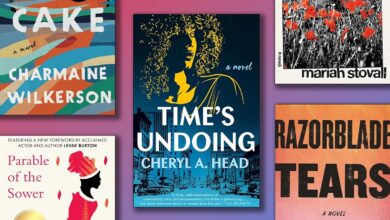This composer-turned-author questions the traditional structures of music and literature

In the new novella “Visiting Composer,” we meet Enid Bluff, a music professor who’s having a bit of a crisis: She’s starting to question her relationship with music.
In the midst of this existential conundrum, a mysterious, seemingly time-traveling composer from the past appears, prompting Bluff to re-examine her life and her art.
“Visiting Composer” was written by Phoenix-based author Andrea Avery, who will be speaking Thursday night at Changing Hands Bookstore in Phoenix.
Avery previously wrote a memoir about her own long, strange trip through the world of music. She said the novella is inspired by some of her actual experiences, but in many ways, she’s using the fictional construct to tell larger truths.
Full conversation
ANDREA AVERY: Writing and music are all bound up for me because I started out wanting to be a musician. I was a pianist as a child, a good one, obsessed with Mozart and wanted to be a composer and pianist. It got complicated for me because I got rheumatoid arthritis. So even though I did end up studying music and sort of eking out a degree in music, that expression of my musical knowledge and my musical understanding and the things that drew me to the piano and made me want to be a music maker were sort of foiled.
So the only way that I can sort of speak the language I’m fluent in — in music — is no longer at the piano. It’s at the keyboard.
SAM DINGMAN: The computer keyboard.
AVERY: Yeah, exactly. The computer keyboard. And also, it turns out that the things that I thought I wanted to be when I thought I wanted to be a composer was I wanted to be a composer of things, but kind of agnostic about what medium.
DINGMAN: Oh, interesting. Interesting. So you were forced to change the tool. But the core creative impulse —
AVERY: And the processes — making a mess and then refining it, sort of making choices about what goes in and what stays out, locating what you’re making in a larger context of how it builds on or pushes back or responds to other things people have made — it’s all the same soup.
DINGMAN: OK, so Andrea, in reference to one of my favorite sayings — and as you have pointed out, nobody is quite sure who said this. The saying is, writing about music is like dancing about architecture. You, in response to that, have said, “Give me a break.”
AVERY: I mean, if people can write about God and accept that they’re never going to get close to it, and they can write about love and accept that they’re going to approximate it but not kind of render it perfectly, then you’re telling me I can’t write about, you know, Mozart? Like, give me a break, you know?
DINGMAN: In that vein, in the book “Visiting Composer,” the protagonist, Enid Bluff, has started to fall out of love with music. And you have written in various places about some points of overlap between you and the character of Enid Bluff.
The book “Visiting Composer” is, to be clear, a novella. But I’m curious, is there any part of you that has started to fall out of love with music, or has your relation to attachment to it changed?
AVERY: Not music writ large. I mean, music will always be — I mean, it’s just absolutely necessary for me. I will say one of the things I have in common with my character, Enid Bluff, is that when I got to college and studied music seriously, I did find some of that study misaligned with what I thought I was signing up for. It was timetables, but with notes. I was like, “This is not what I wanted.”
DINGMAN: Yeah. Like the musical equivalent of, like, diagraming sentences.
AVERY: Yeah. But it wasn’t the music that was disappointing to me. It was the study of music. If I had mistaken the study of music for music, I might have fallen out of love with music. I think I fell out of love with studying music.
DINGMAN: Yeah. Well, part of the goal here also, it seems like, in this book is to interrogate not just the way music is taught in a purely technical sense, but also the dearth of female composers that music students are introduced to.
AVERY: Yeah. I mean, I clocked as a college student that there weren’t a lot of women, but I didn’t know to be outraged by it. So I was aware that, like, where are the girls, you know? Oh, I guess they’re in pop music. And and the geniuses are over here in the serious music that we study in our textbooks.
And I do think this doesn’t seem right. And I also didn’t have the understanding that I have now, that a curriculum is the product of choices, and a curriculum is always a depiction of value. It was an awakening for me, too — again later, post college — that like, “Oh, why was all the music not made in the West ‘world music’?” Like, there’s serious music, and then there’s music by women, and there’s music by not-white people. And it’s just kind of gross.
DINGMAN: It strikes me also, maybe there that part of what you’re talking about is this sense that men are allowed to set the rules of a medium and also to break them. And both the setting in the breaking is considered serious and genius.
AVERY: You know, there’s some freedom in that, too, though, because if you, don’t have a sort of established lineage of geniuses that you have to either uphold their tradition or live up to them or be the next one, you can just be who you are and create what you want to create. But it does matter that we point out who made things besides the same old guys.
I like John Cage. I just thought at the time, “Is this all there is?” This was 40 years ago, too.
DINGMAN: Why is he the only name that ever gets mentioned?
AVERY: Yeah. You need to see yourself. If you want to be a thing, you need to see versions of that thing that look like you or sound like you or move like you or draw on similar cultural traditions as you or use language the way you do. And if you don’t, you kind of wither on the vine.
DINGMAN: You have also said that in your mind, it’s not as though female composers are these hidden rarities buried in the depths of libraries. They’re out there in the world making music. And it’s not just like, look, women are making music, but they’re making some of the most interesting, innovative music that we have. I listened to a composition by — I think this is somebody who you went to school with?
AVERY: Is it Beth?
DINGMAN: Beth Schenck.
AVERY: Yeah.
(“Missing Persons” by Beth Schenck plays)
DINGMAN: You highlighted this track, “Missing Persons,” because it reminded you of the way that your novella ends, if I’m not mistaken. Talk a little bit about what you hear in that music and why you’d like to have more people check it out Beth’s music.
AVERY: Yeah. Well, the sound of a saxophone, the sort of aspirating and then sort of woody sound of the reed and the breath between notes and the when you can hear the “pop, pop, pop” of the pads. To me, that sounds like Beth’s voice to me. That instrument sounds like her speaking to me.
So that record is great for that reason. It’s especially special to me because that’s my friend.
DINGMAN: Yeah. One of the things you highlighted in another piece that you wrote about this is that there’s something about that particular song, “Missing Persons,” and its vanishing ending.
I realize we’re about to kind of dance about architecture in conversation here. But can you say a little bit more about why you think that’s an interesting way to end a song and perhaps a novella?
AVERY: Yeah. Well, so it’s a premise of the book that Gloria Clifford, this composer that Enid gets to meet and spend sort of a magical three days with, is from another time and is somebody whose life ended in a sort of fizzled-out disappearance. She just has gone missing.
I think that very concept sort of pushes against a sort of a narrative expectation, right? Things are supposed to have a beginning, a middle and an end. But what if a story, what if a life has a beginning that’s full of promise and a middle that’s a little more complicated? There’s some there’s some difficult boys and loss and grief. But what if it doesn’t have an end?
Some of the things we expect of music — and I’m going to sound like a John Cage fan here — is like, maybe music doesn’t have to have a melody that’s singable. Maybe it doesn’t need to hang on a neat, recognizable major-minor harmonic structure.
And so that piece of Beth’s, I think, sort of foils musical expectations, too, because it sort of vanishes. I’m drawn to this sort of the challenge of a narrative that it doesn’t end. And I like that piece of music for the same reason.
KJZZ’s The Show transcripts are created on deadline. This text is edited for length and clarity, and may not be in its final form. The authoritative record of KJZZ’s programming is the audio record.




